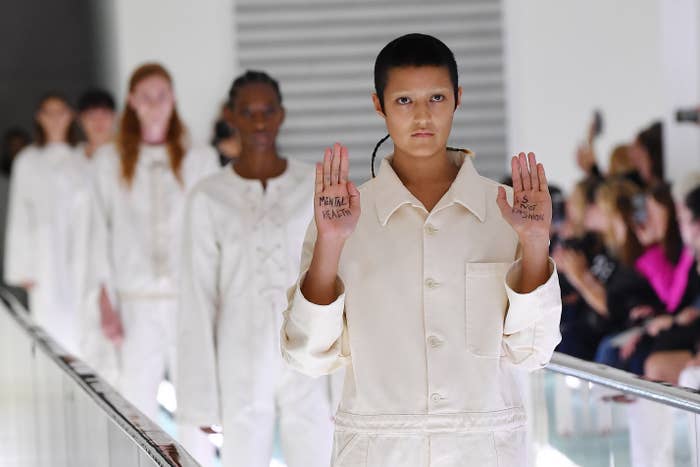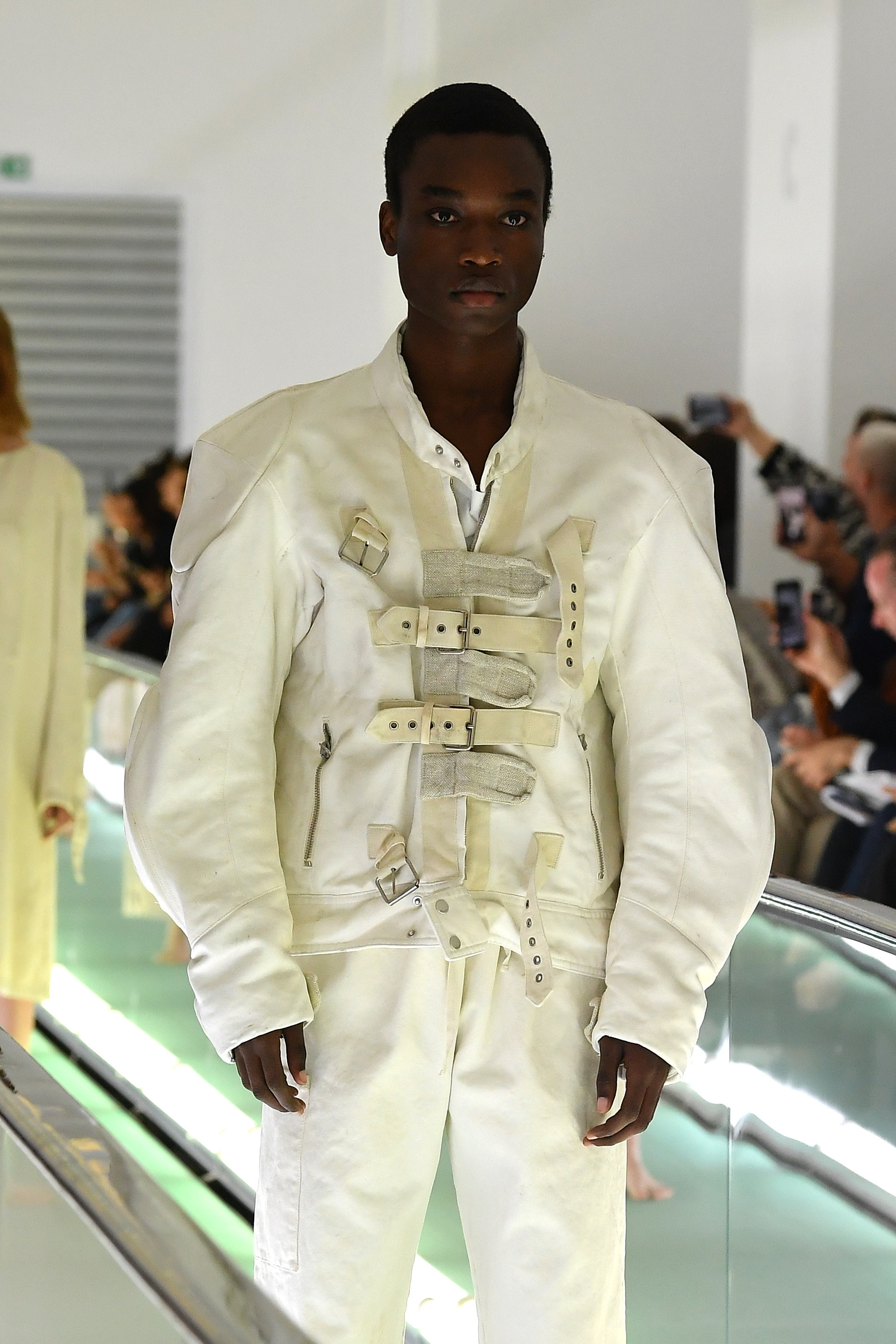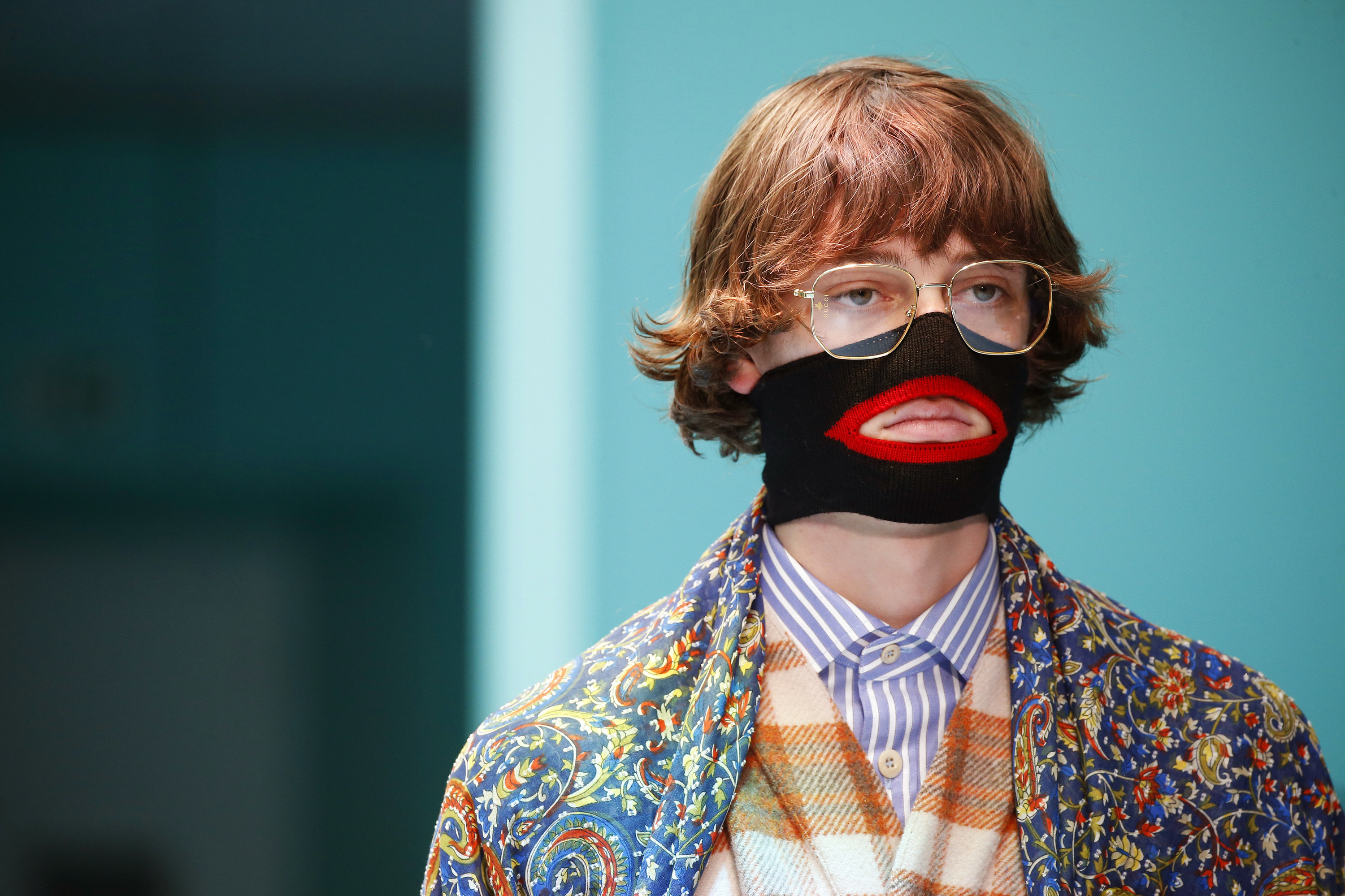
A model staged a runway protest against Gucci, slamming the brand’s “offensive” use of straitjackets "alluding to mental patients” in its spring/summer 2020 collection during Milan Fashion Week on Sunday.
Ayesha Tan-Jones, a 26-year-old nonbinary model, artist, and musician who uses "they"/"them" pronouns, held up their hands on the runway to display a message that read: “Mental health is not fashion.”
In an Instagram post Sunday, Tan-Jones wrote, “As an artist and model who has experienced my own struggles with mental health, as well as family members and loved ones who have been affected by depression, anxiety, bipolar and schizophrenia, it is hurtful and insensitive for a major fashion house such as Gucci to use this imagery as a concept for a fleeting fashion moment.”
The model added, “It is in bad taste for Gucci to use the imagery of straight jackets and outfits alluding to mental patients while being rolled out on a conveyor belt as if a piece of factory meat.”
Tan-Jones told BuzzFeed News on Monday that they made a “last-minute” decision to protest against Gucci the night before the show after a fellow model “walked off the job” because he was “disgusted by the clothes and chose to go home.”
“For me, I chose to use the platform to highlight the issue,” the London-based model said.
In an Instagram post on Sunday, Gucci wrote that the “utilitarian clothes," including straitjackets, were intended as a “statement for the fashion show” and would not be sold to customers.
The brand said that its designer, Alessandro Michele, created the “blank-styled clothes” to represent “the most extreme version of a uniform dictated by society and those who control it.”
The 89-look collection also showcased colorful clothes that were meant to be seen as Gucci’s “antidote” to society’s curbing of identity and self-expression, the brand said.
After the show, Michele told the New York Times that he wanted to depict “how society today can have the ability to confine individuality and that Gucci can be the antidote. For me, the show was the journey from conformity to freedom and creativity.”
Gucci felt the model should be free to protest based on the show’s theme of freedom, the Times reported.
Gucci did not respond to a request for comment.
Tan-Jones told BuzzFeed News that many other Gucci models felt similarly about the brand’s depiction of straitjackets and that they “spoke at length” about whether to take action against the fashion house.
Tan-Jones was the only model who protested on the runway, adding that without the other models’ support, “I would not have had the courage to walk out and peacefully protest.”

Tan-Jones said that Gucci’s use of mental health imagery in fashion hit “especially close to home as the modeling industry isn’t particularly nourishing for one’s mental health.”
In their Instagram post, Tan-Jones wrote that straitjackets were “a symbol of a cruel time in medicine when mental illness was not understood” and when people were “abused and tortured” in mental health institutions.
“Presenting these struggles as props for selling clothes in today’s capitalist climate is vulgar, unimaginative and offensive to millions of people around the world affected by these issues,” Tan-Jones wrote in their post.
While several people online supported Tan-Jones’ protest, others, such as American model and actor Hari Nef, praised Gucci’s show, saying, “The clinical whites that opened the show were upsetting — willfully: more a provocative reminder of submission than a glamorization of insanity.”
Responding to the support they received after the protest, Tan-Jones said that “this sort of bravery is only a simple gesture compared to the bravery that people with mental health issues show every day. To have the bravery to get out of bed, to greet the day, and to live their lives is an act of strength, and I want to thank you for being here and being YOU!”
Tan-Jones vowed to donate 100% of their fee to mental health charities once they got paid for the show.
Gucci also came under fire this year for using racist imagery while selling a balaclava knit top that resembled blackface. The brand apologized in February and removed it from its online and physical stores, saying, "We consider diversity to be a fundamental value to be fully upheld, respected, and at the forefront of every decision we make."
The cutouts resembling blackface were previously featured on models at Gucci's fall/winter collection at Milan Fashion Week in 2018.

In May this year, Gucci was also accused of cultural appropriation after a blue turban — which originally appeared in its 2018 fashion show — was being sold for $800 at Nordstrom.
Wow. @Gucci and @Nordstrom are selling turbans as fashion items. We're attacked and killed for how we look, and now corporations get to profit off that same look? Feels wrong to me. Your thoughts? https://t.co/Em9UELbkTB
